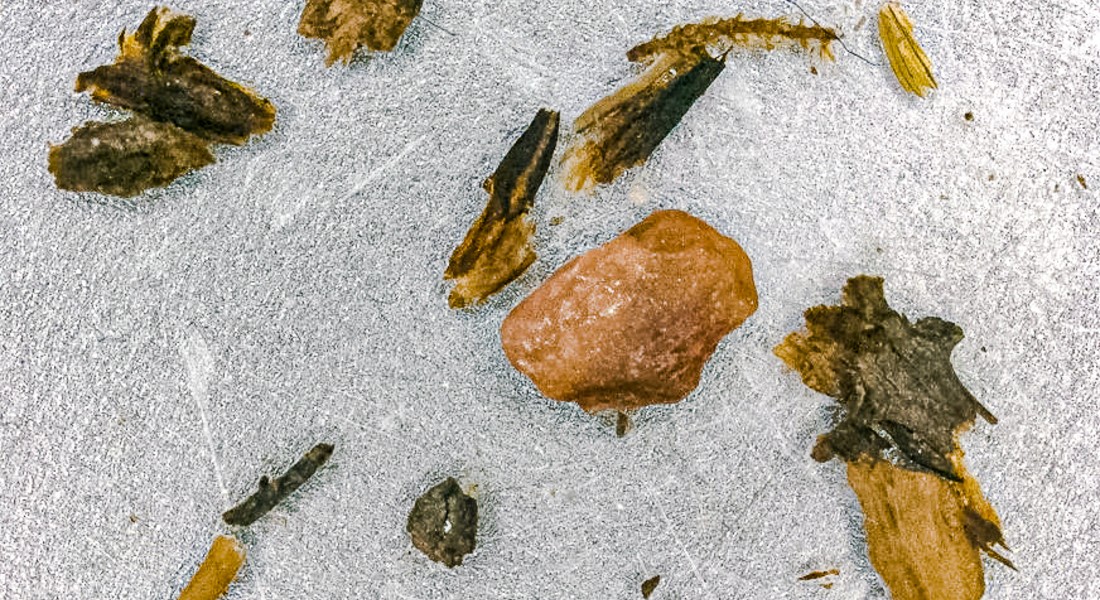
For the first time ever, researchers have found fossils under Greenland’s ice sheet that are so large and well preserved that they can be seen with the naked eye.
The fossils reveal several million years of details about climate and plant life in Greenland, the researchers report.
Following a relocation to the Copenhagen suburb of Rødovre in 2017, researchers found unopened boxes of ice cores dating back to 1966—the first ice cores drilled on Earth.
Researchers have now completed analyses of the long-forgotten ice and present them in a new study with groundbreaking results.

Within the cores, which come from deep within the ice sheet at Camp Century, Greenland, researchers became the first ever to find these millions-of-years-old macrofossils, which are large enough to be seen without a microscope.
“We pinched ourselves over the treasure we’d found! Because within the cores, which for the most part resemble compressed gravel, we could identify entire twigs and leaves, perfectly preserved after millions of years. We had never found anything like this, nor had anyone else,” says Dorthe Dahl-Jensen, professor at the University of Copenhagen’s Niels Bohr Institute.
“Thorough DNA analyses are typically required to identify which plants and animals are in ice. But here, we could see things immediately. The ice was drilled in an amazing location where there were obviously plants and branches before ice covered Greenland.”
“These results illustrate just how awesome ice is and how it can withstand so much—including periods of higher temperatures like the one we are in now.”
While twigs and leaves may not sound like much, they reveal a rare and unique story about the vegetation of the Greenlandic landscape as it was millions of years ago, when Earth’s climate was warmer, and Greenland wasn’t covered by ice.
“Among the leaves, twigs, and plant remnants we found are liverwort plants and wooly feather moss. Our analyses show that they come from boreal forest—the conifer, birch, and willow forests common to Canada and Alaska. These hardy plants and trees are tolerant of cold conditions,” Dahl-Jensen says.
The ice cores have also provided the researchers with knowledge about climate change in Greenland dating back several million years. This knowledge is useful for helping us peer into the crystal ball and see the climate of the future.
“After measuring water isotopes in the ice, we can confirm earlier findings that the ice sheet has been intact and covered Greenland for roughly one million years. Before then, there were periods in between ice sheets when Greenland was ice-free. These results illustrate just how awesome ice is and how it can withstand so much—including periods of higher temperatures like the one we are in now,” Dahl-Jensen says.
According to the researcher though, the rise in temperature that several climate models predict will occur over roughly the next 100 years will strongly influence the ice.
“Should the worst-case scenarios transpire, the Greenland and Antarctic ice sheets will start melting, which could cause sea levels to rise up to 70 meters [229.67 feet]. However, this will take a long time, thousands of years. Fortunately, we can still do something about it and avoid these large rises in sea level—it’s a matter of action,” she says.
The next step in working with the forgotten ice cores of Camp Century is to perform DNA analyses of both the ice and sedimentary residues.
“We’ll see if we can find remnants of beetles, butterflies, and other insects too,” Dahl-Jensen says.
The paper appears in the Proceedings of the National Academy of Sciences.
Source: University of Copenhagen
The post Team finds intact plant fossils under Greenland ice sheet appeared first on Futurity.
from Futurity https://ift.tt/3cB3lRz
No comments:
Post a Comment